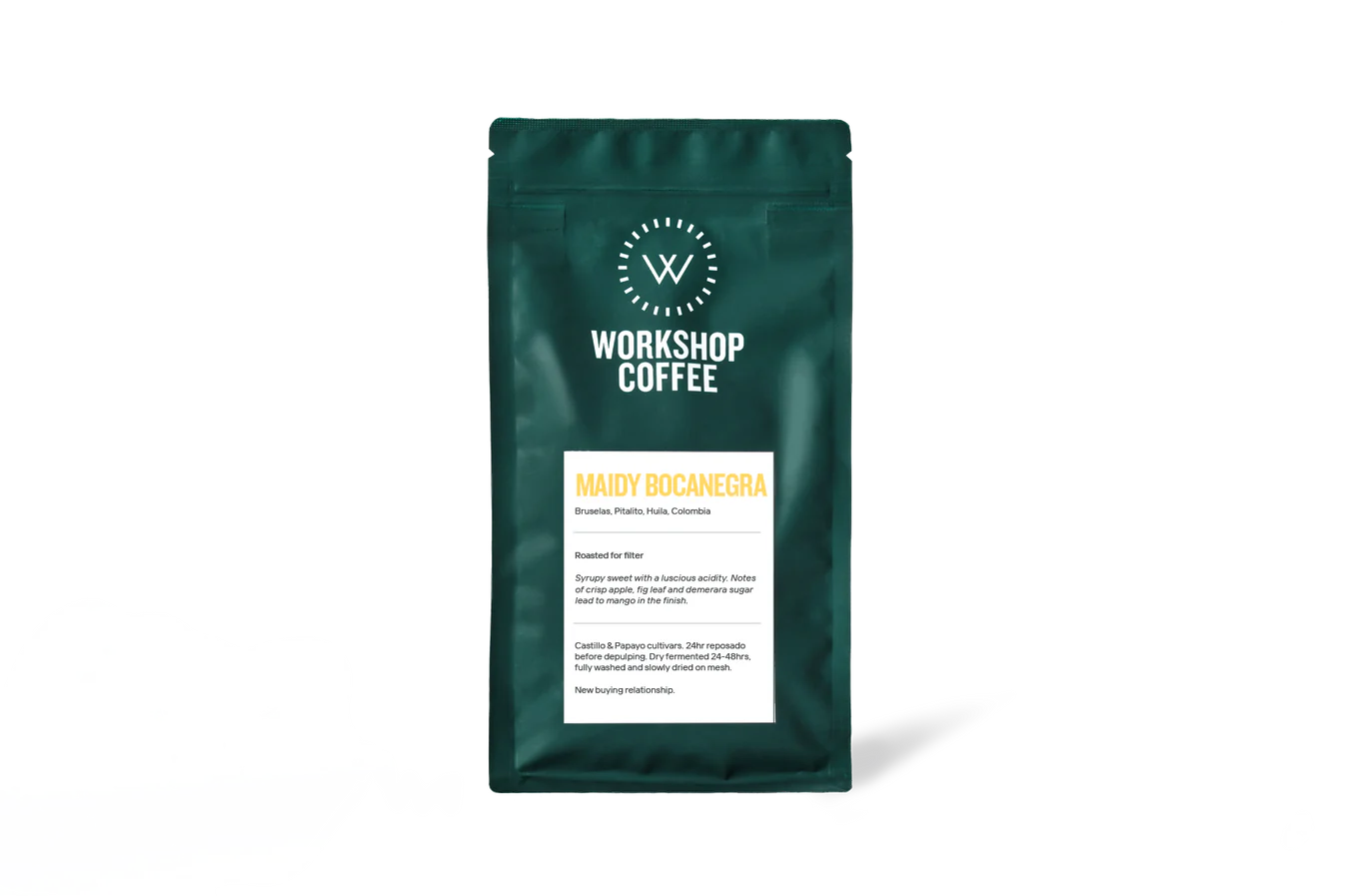Maidy Bocanegra - Filter - Colombia - 250g
Sold Out £14.00
Tasting notes:
Syrupy sweet with a luscious acidity. Notes of crisp apple, fig leaf and demerara sugar lead to mango in the finish.
Fairly new to the world of specialty coffee, this mixed cultivar lot from 21 year old Maidy Bocanegra and her family speaks of great things to come.
We’re excited to begin working with this coffee producer from Bruselas in Colombia’s Huila region. Maidy Bocanegra is fairly new to the world of
specialty coffee but this mixed cultivar lot of Castillo and Papayo speaks of great things to come.
Maidy Bocanegra and her husband, Alberto Mendez, moved to Pitalito in 2020 to establish their coffee farm, Finca Los Limones, named for the previous use of the land to cultivate limes. They moved from a background of cattle farming in Cauca having been displaced by guerrilla warfare. 2 of the 3 hectares are planted out with various cultivars of coffee, including Castillo, Pink Bourbon and Papayo (a rather unusual Ethiopian cultivar with elongated, papaya-shaped coffee cherries). With help from Caravela’s PECA (agronomical training team) program they are evolving
their farm’s infrastructure and protocols to maximise the quantity and quality of their harvest.
The couple rely on help from their parents and siblings for the daily tasks of running the coffee farm, as well as employing extra help of around 10 pickers during the main harvest, who mostly come through family
connections. Once the selective manual picking is done they are first ‘resting’ the coffee cherries in the reception tank for a day, a protocol sometimes dubbed ‘reposado’ which can augment the perceived sweetness or ripeness of the fruity characteristics in the final cup, most likely due to the fruit begin to macerate slightly and soften, perhaps making depulping easier and kick-starting the following
fermentation stages. They use a traditional iron depulper to remove the outer fruit skins and let the mucilage covered parchment coffee ferment in open air tanks for between 24 and 48 hours depending on the climate.
The coffee is then fully washed and starts the drying process in a shaded area under the floor to ‘drain’ on a mesh material. After the initial moisture has drained off the coffee spends between 15 and 20 days slowly drying in a solar tent on mesh to achieve an optimal
moisture content.
They hope in the future to develop their drying areas, plant more interesting coffee cultivars like Ombligon and to be able to hire more help on the farm, particularly during harvest. Their message to coffee
consumers around the world is to reflect on the labour-intensive nature of coffee production and stress the importance of environmental stewardship. We’re grateful to Maidy and her family for embarking on
their journey into coffee production and pleased to be able to work with them via our sourcing program with Caravela.
The Exporter
Typically, Caravela operate an 80/20 model, working with a vast majority of smallholders and a minority of
farmers with large coffee estates. In their latest impact report 87% of their producing partners had farms of less than 5 hectares in size. More than half of the producers they worked with were visited by their PECA team, and in Colombia alone they are working with 1,746 producers across 52 communities.
As regards their PECA program, they have said the below:
“Coffee growers are the heart of our business model, without them we could not maintain and sustain this value chain. They are responsible for producing the best coffees that delight us every day. The Coffee Growers Education Program (PECA) has developed a symbiotic relationship between coffee growers and Caravela since we’re always learning from each
other. For many years, we have accumulated experiences throughout experimentation and work that provides tools to empower and educates
coffee growers, resulting in consistent high-quality coffees.”
© 2025 G!RO .

